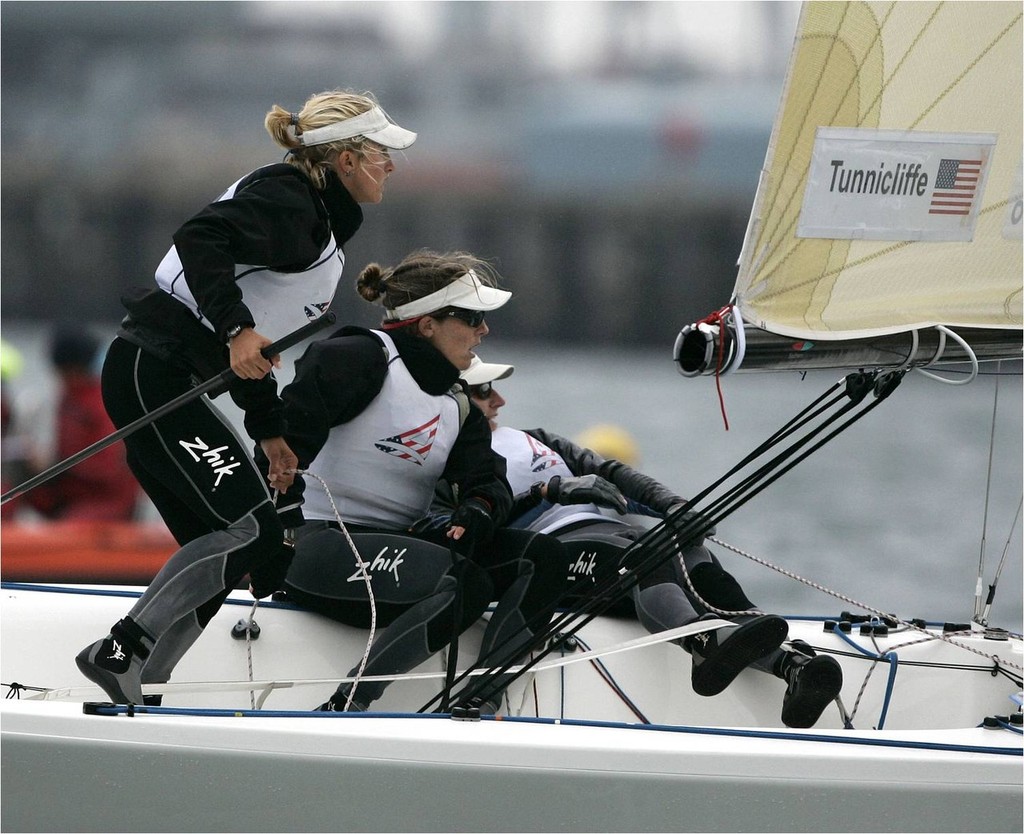Sail for Gold Regatta - US Sailing Team Coach looks to the future
by Hope Campbell on 31 May 2012

Anna Tunnicliffe Zhik
http://www.zhik.com
On the eve of the 2012 Skandia Sail for Gold regatta, at the Olympic venue in Weymouth, where the British team is expected to dominate, it’s interesting to look at the overall performances of countries in Olympic sailing.
Since the modern Olympics began in the 1900s, the US has taken home more sailing gold than any other nation. The US Olympic sailing team has taken home 59 gold medals over the past 100+ years, while the British team has not been far behind with a total of 50.
The team peaked in 1992 at the summer games in Barcelona, winning one gold medal, six silvers and two bronze. Since then, it has been an uphill battle and over the last three Olympics, the United States has ranked fifth overall in sailing.
Kenneth Andreasen, the High Performance Director for the U.S. Olympic Sailing Team, attributes this to sailing athletes competing domestically during the Olympic selection process rather than internationally where the competition is more well-rounded and on par with how the actual Olympic games will go.
'The U.S. Olympic Sailing Committee has tried over this quad to make everything about our program relate more to the International competition, so that means our trials now have two international components where we are selecting the sailors who can indeed compete against the international competition,' explains Andreasen.
'There is not much sense in sending a sailor who can beat everybody at home. We want to send a sailor who can actually beat everybody around the world.'
The Denmark-born Andreasen took over as High Performance Director of the U.S. team in 2008 after Gary Bodie retired in after 10 years coaching the team through three Olympics. He came to the job after coaching U.S. sailor Zach Railey to a silver medal in the Qingdao regatta during the Beijing games four years ago. When Andreasen took over, he and …Dean Bremmer shifted the focus of the U.S. team from domestic to international events and has seen a distinct performance difference.
'Our bone structure and everything is centered around performing at a high level of international events and we have seen the results,' Andreasen says. 'They have kept improving over the quad and we are pleased with how this is working out.'
In the past, just a single domestic regatta determined the selection of the U.S. team, while the rest of the world has competed on the international level. Over the last quad, the focus for the U.S. team has shifted to more global events and keeping in step with the rest of the world, which has in turn improved the team’s Olympic prospects.
'The capacity is there in this sailing program that did really well over the last few quads or many quads,' says Andreasen. 'Everybody is working harder. We are doing our best to keep up and hopefully surpassing everybody and we have high expectations. We know our team is super talented and we are very confident that we have taken some good steps here in the right direction.'
Andreasen attributes much of the team’s new international success and enhanced selection process to sponsorship and funding. Until May of 2012, AlphaGraphics was the team’s title sponsor and recently Sperry took over that position. Through increased corporate funding, the U.S. team has been able to accomplish much of what it set out to do after the Beijing games and is in prime shape for the 2012 London Olympics in July.
'Having a title sponsor has made a huge difference for us,' notes Andreasen. 'We are able to hire the best coaches. We are able to give the sailor finding that we haven’t been able to before and take the necessary steps to get where we need to be, which is at the top of the podium in 2012. That’s a huge improvement and one that we are working on continuing and improving.'
Andreasen prefers not to look back on what once was during the glory days of U.S. Olympic sailing, but instead is looking towards the future and a future full of successes.
'My job is not to really look at the history because it doesn’t matter that we won all these medals in 1992,' he says. 'What matters is that we win a lot of medals in 2012.'
US Olympic Sailing Team:
- Amanda Clark (Shelter Island, N.Y.) and Sarah Lihan (Fort Lauderdale, Fla.) – 470 (Women’s Two Person Dingy)
- Anna Tunnicliffe (Plantation, Fla.), Molly Vandemoer (Stanford, Calif.) and Debbie Capozzi (Bayport, N.Y.) – Elliott 6m (women’s match racing)
- Bob Willis (Chicago, Ill.)—RS:X (Men’s Windsurfer)
- Erik Storck (Huntington, N.Y.) and Trevor Moore (Pomfret, Vt./Naples, Fla.)—49er (Men’s Two Person Dinghy High Performance)
- Farrah Hall (Annapolis, Md.) – RS:X (Women’s Windsurfer)
- Mark Mendelblatt and Brian Fatih (both Miami, Fla.) – Star (Men’s Keelboat)
- Paige Railey (Clearwater, Fla.) – Laser Radial (Women’s One Person Dingy)
- Rob Crane (Darien, Conn.)—Laser (Men’s One Person Dingy)
- Stu McNay (Boston, Mass.) and Graham Biehl (San Diego, Calif.)—470 (Men’s Two Person Dingy)
- Zach Railey (Clearwater, Fla.) – Finn (Men’s One Person Dingy Heavy)
US Paralympic Sailing Team:
- Jen French and JP Creignou (both St. Petersburg, Fla.) – SKUD-18 (Two Person Dingy)
- Mark LeBlanc (New Orleans, La.) – 2.4mR (One Person Dinghy)
- Paul Callahan (Cape Coral, Fla./Newport R.I.), Tom Brown (Castine, Me.) and Bradley Johnson (Pompano Beach, Fla.) – Sonar (Three Person Dinghy)
Sail for Gold website
US Sailing Team website
If you want to link to this article then please use this URL: www.sail-world.com/98543